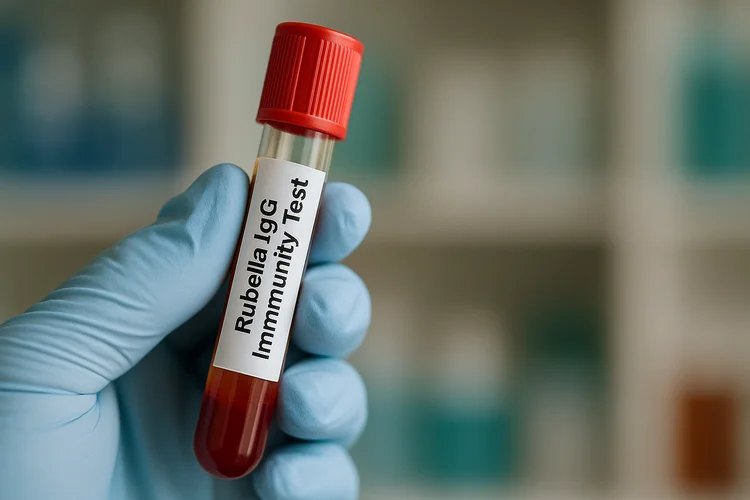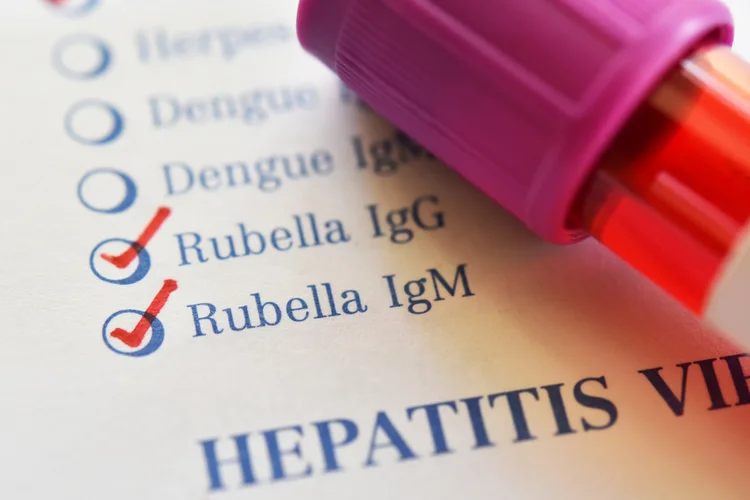Rubella IgG Immunity Test
Last updated: Dec 20, 2025
What Is a Rubella IgG Immunity Test?
The rubella IgG immunity test is a serological blood test
that identifies immunoglobulin G (IgG) antibodies targeting the rubella virus, showing whether you have acquired
immunity through prior infection or the MMR (measles, mumps, rubella) vaccine.
This screening is frequently requested to detect rubella protection, which is especially
relevant for women who are pregnant or planning pregnancy, as well as those preparing for
specific medical treatments.

How Does the Rubella IgG Immunity Test Work?
The Rubella IgG immunity test involves taking a blood sample to check for immunoglobulin G (IgG) antibodies that respond to
the rubella virus.
IgG is a type of antibody produced by the immune system after a past rubella infection or
vaccination. These antibodies support the body’s long-term immune response and typically remain in
the bloodstream for life. This is different from IgM antibodies, which appear earlier and usually
indicate a recent or active infection.
If IgG antibodies are detected, it usually indicates that you have developed immunity and are
protected against rubella. If no antibodies are found, it suggests that you are not currently immune
and may be at risk of infection.
When Should You Consider a Rubella IgG Immunity Test?
Rubella IgG testing may be considered to determine whether you have developed immunity to rubella through past infection or vaccination, helping to guide both personal and public health decisions.
- Pregnant individuals undergoing routine antenatal screening.
- Individuals preparing for pregnancy who need to confirm immunity.
- Adults without documented MMR vaccination or uncertain immunisation records.
- Healthcare workers, especially those in obstetrics, paediatrics, or infectious disease settings.
- Employees or students in environments where proof of immunity is required.
- People recently exposed to someone diagnosed with rubella.
If you are unsure whether this test is suitable for you, consult a doctor for individualised guidance.
What Do Rubella IgG Immunity Blood Test Results Mean?
Rubella IgG immunity test results can be positive, negative, or equivocal, depending on the level of antibodies found in your blood. These levels are typically measured in international units per millilitre (IU/mL).
- Positive Result – Rubella-specific IgG antibodies are present at a sufficient level, indicating past infection or successful immunisation. This suggests that you are immune to rubella.
- Negative Result – No detectable IgG antibodies were found, indicating that you are not currently immune and may be at risk of infection. Vaccination is generally advised if you are not pregnant.
- Equivocal Result – The antibody level falls within an inconclusive range. Your doctor may recommend retesting after a short interval or consider vaccination based on your circumstances.
Your doctor will review the test results in the context of your medical history and vaccination records to determine the most appropriate next steps.

Rubella IgG Test Cost
At ATA Medical, we offer rubella IgG immunity testing along with a range of related tests and vaccinations. Prices are as follows:
| Test / Vaccinations | Price* |
|---|---|
| Consultation | From $49.05 |
| Immunity Testing | |
| Rubella IgG Antibody | $28.34 |
| Measles IgG Antibody | $100.28 |
| Mumps IgG Antibody | $144.97 |
| Varicella-Zoster IgG Antibody | $28.34 |
| Hepatitis Bs Antigen & Antibody | $21.80 |
| Vaccinations | |
| Measles, Mumps, Rubella (MMR) Vaccine | From $0 per dose (depending on age and eligibility for CHAS, PG, or MG subsidies) |
| Varicella (Chickenpox) Vaccine | $103.55 per dose |
| Shingles Vaccine | $375 per dose |
| Hepatitis A & B Vaccine | From $54.50 per dose |
^Prices last updated on Jan 28, 2026. While every effort is made to keep pricing information up to date, please contact our team to confirm the latest rates.
How Long Does a Rubella IgG Immunity Test Take?
The full process for a Rubella IgG immunity test at our clinic usually takes between 30 and 60
minutes. This includes time for registration, a brief consultation, and the collection of your blood
sample.
Laboratory results are generally available within 3 to 5 working days. Once the results are ready,
your doctor will follow up with you by phone or email to discuss what they mean and advise you on
any next steps if needed.
How to Prepare for a Rubella IgG Immunity Test?
You do not need to follow any special preparations before having a Rubella IgG immunity test. You
can eat and drink normally, and fasting is not required.
If you are currently unwell or taking medication that may influence your immune response, it is
important to inform your doctor ahead of your appointment. They may recommend a different testing
time to help ensure precise results.
Where Can You Get a Rubella IgG Immunity Test in Singapore?
ATA Medical @ Orchard
Nearest MRT: Orchard Boulevard Station (TE13)
Contact Number: 6223 0682
Email: camden@atamed.sg
Opening Hours:
Mon - Fri: 8:30 AM to 12:30 PM, 1:30 PM to 5:30 PM
Sat: 8:30 AM to 12:30 PM
Sun & PH: Closed
ATA Medical @ Tanjong Pagar
Nearest MRT: Tanjong Pagar Station (EW15)
Contact Number: 6223 0682
Email: hi@atamed.sg
Opening Hours:
Mon - Fri: 8:30 AM to 12:30 PM, 1:30 PM to 5:30 PM
Sat: 8:30 AM to 12:30 PM
Sun & PH: Closed
ATA Medical @ Jurong
Nearest MRT: Jurong East MRT Station (NS1/EW24)
Contact Number: 6348 6292
Email: jurong@atamed.sg
Opening Hours:
Mon - Fri: 8:30 AM to 12:30 PM, 1:30 PM to 5:30 PM
Sat: 8:30 AM to 12:30 PM
Sun & PH: Closed


